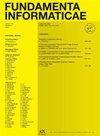RESULTS FROM Υ(5S) AT BELLE: STRANGE BEAUTY AND OTHER BEASTS
IF 0.4
4区 计算机科学
Q4 COMPUTER SCIENCE, SOFTWARE ENGINEERING
引用次数: 1
Abstract
The Belle experiment collected in 2005-6 a total of 23.6 fb 1 of data at the �(10860) resonance, also known as �(5S). These constitute nearly all of the world’s sample of e + e → �(10860) events, which provide clean Bs pairs. We present here several Bs and �(10860) properties recently extracted from these data.结果从Υ(5秒)在美女:奇怪的美女和其他野兽
贝尔实验在2005- 2006年收集了10860共振(也称为5S)的23.6 fb / 1的数据。它们几乎构成了世界上所有的e + e→o(10860)事件样本,这些事件提供了干净的b对。本文介绍了最近从这些数据中提取的几个b和o(10860)性质。
本文章由计算机程序翻译,如有差异,请以英文原文为准。
求助全文
约1分钟内获得全文
求助全文
来源期刊

Fundamenta Informaticae
工程技术-计算机:软件工程
CiteScore
2.00
自引率
0.00%
发文量
61
审稿时长
9.8 months
期刊介绍:
Fundamenta Informaticae is an international journal publishing original research results in all areas of theoretical computer science. Papers are encouraged contributing:
solutions by mathematical methods of problems emerging in computer science
solutions of mathematical problems inspired by computer science.
Topics of interest include (but are not restricted to):
theory of computing,
complexity theory,
algorithms and data structures,
computational aspects of combinatorics and graph theory,
programming language theory,
theoretical aspects of programming languages,
computer-aided verification,
computer science logic,
database theory,
logic programming,
automated deduction,
formal languages and automata theory,
concurrency and distributed computing,
cryptography and security,
theoretical issues in artificial intelligence,
machine learning,
pattern recognition,
algorithmic game theory,
bioinformatics and computational biology,
quantum computing,
probabilistic methods,
algebraic and categorical methods.
 求助内容:
求助内容: 应助结果提醒方式:
应助结果提醒方式:


